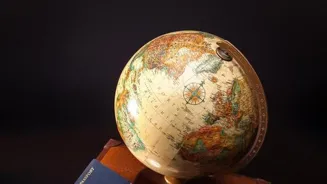Embark on a journey with 10 Smart Tips for Currency Exchanges While Traveling in India! Learn to save money abroad
So, you've booked your tickets, packed your bags, and are dreaming of that amazing trip
abroad. Whether it's the bustling streets of Bangkok, the romantic charm of Paris, or the adventurous landscapes of New Zealand, one thing's for sure: you'll need to deal with foreign currency.
Exchanging your hard-earned rupees into the local currency can be a bit of a tricky game if you're not careful. But don't worry, we've got you covered!
Here are 10 super useful tips to help you navigate currency exchanges like a pro, ensuring you get the best possible rates and avoid unnecessary fees, all while keeping your wallet happy. After all, you want more money for those delicious street snacks and amazing souvenirs, right?
Plan Ahead, But Don't Rush:
Avoid waiting until the last minute to exchange your currency. Airport exchange booths often offer the worst exchange rates due to their convenience and captive audience. Seriously, they know you're desperate! As soon as you know you're traveling, start monitoring exchange rates online.
Websites like XE.com and Google Finance are your friends. Also, keep an eye on how the rupee is performing against the currency you need. This will give you a general idea of what a fair exchange rate looks like. At the same time, don't feel pressured to exchange all your money at once.
Exchange rates fluctuate, so spreading your exchanges over a few days or weeks can help you get a better average rate. Think of it like investing—you wouldn't put all your money in at the peak, would you?
Ditch the Airport Exchanges (If You Can!):
As we mentioned earlier, airport exchange kiosks are notorious for their exorbitant fees and unfavorable exchange rates. They thrive on the fact that you might be in a hurry or forget to exchange money beforehand. The best approach is to avoid them altogether if possible!
Instead, consider these alternatives: Your bank or a reputable currency exchange service in your city will usually offer far better rates. Or, even better, wait until you arrive at your destination and use a local ATM.
Just make sure you inform your bank beforehand that you will be using your card abroad to avoid any transaction blockage. Always compare and plan for the best approach.
Embrace the Plastic (Smartly!):
Credit and debit cards can be a convenient way to pay while traveling, but be mindful of fees. Many Indian banks charge foreign transaction fees, which can eat into your budget.
Before you leave, check with your bank to understand their fees and consider applying for a credit card with no foreign transaction fees, if you don't already have one. While using your card abroad always opt to pay in the local currency as this offers transparency.
Also, report to your bank of the period that you will be out for, this allows for unhindered access of your funds on your travel. Also, monitor your statement for any fraud attempts.
ATMs are Your Friend (Most of the Time):
Using ATMs abroad is often a cost-effective way to get local currency. However, do your homework first! Banks often provide better exchange rates than currency exchange services, but you'll still need to be aware of potential fees.
Check with your bank about international ATM fees and daily withdrawal limits before you travel. Choosing to withdraw larger sums that you can keep safely will also minimize the charge that you might have incurred.
Some ATMs may also charge their own usage fees, so try to use ATMs that are affiliated with major international banks to avoid these charges. Be vigilant of the ATM you make use of, avoid standalone ATMs that look suspicious.
Shop Around and Compare Rates:
Don't settle for the first exchange rate you see. Just like you compare prices when you're shopping for clothes or electronics, you should compare exchange rates at different banks, exchange services, and even ATMs. A few minutes of research can save you a significant amount of money.
Look for exchange services that are transparent about their fees and commissions. Some services advertise "zero commission" but make up for it with a less favorable exchange rate. Always ask for the final amount you'll receive in the local currency before committing to the transaction.
Comparing helps you avoid losing hard earned money.
Haggle (But Respectfully!):
In some countries, particularly in Southeast Asia and parts of the Middle East, haggling is a common practice, even when exchanging currency. Don't be afraid to politely ask for a better rate, especially if you're exchanging a large sum of money.
Be friendly and respectful, and remember that a smile can go a long way. However, be aware that haggling for currency exchange is not acceptable in all countries, so observe local customs before attempting to negotiate. Being friendly and understanding goes a long way in making deals.
Small Bills are Your Best Friend:
Before you leave the exchange counter, ask for a mix of small and large bills. Small bills are incredibly useful for tipping, buying snacks from street vendors, and paying for transportation.
Trying to pay for a ₹20 rickshaw ride with a ₹2000 note will likely lead to frustration (and possibly a higher fare!). Having a variety of denominations will make your life much easier and help you avoid overpaying. Keep the currencies safe and distributed with you.
Keep an Eye on the News:
Staying informed about current events can impact your currency exchange strategy. Political instability, economic downturns, or major policy changes can all affect exchange rates.
Keep an eye on the news in both India and your destination country to anticipate potential fluctuations and adjust your exchange strategy accordingly. Timing is important, and being informed can save you more money.
Don't Exchange Back Unnecessary Currencies:
When your trip is coming to an end, avoid exchanging your leftover currency back into rupees unless absolutely necessary. You'll likely lose money on the second exchange.
Instead, consider saving it for your next trip to the same country, or if you are sure you won't travel there anytime soon, try giving the currency to friends or family who may be planning to travel. Also, keep the coins so they can use it again for some activity.
If you only have a small amount left, you can use it to pay for your last meal or buy a small souvenir at the airport.
Budget Wisely and Track Your Spending:
Currency exchange is just one part of managing your travel finances. Before you even start exchanging money, create a realistic budget for your trip. Estimate how much you'll spend on accommodation, food, transportation, activities, and souvenirs.
Use a budgeting app or spreadsheet to track your spending and make sure you're staying within your limits. This will help you avoid running out of money or needing to exchange more currency at unfavorable rates. Remember, a little planning goes a long way!
By following these 10 tips, you'll be well-equipped to navigate currency exchanges like a seasoned traveler and make the most of your trip without breaking the bank. Happy travels!
AI Generated Content. Glance/InMobi shall have no liability for the content

















